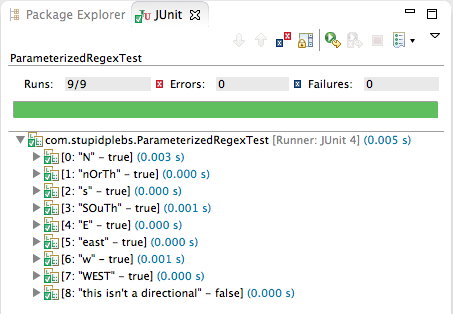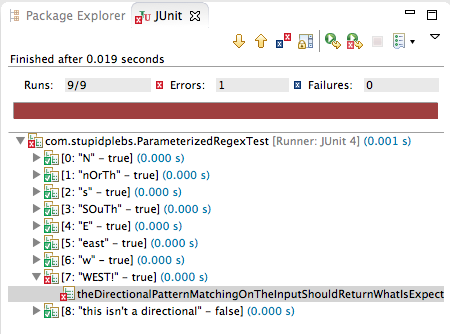Parameterized Tests are Freakin' Awesome for Unit Testing Regular Expressions
27 January 2013
I've been looking for a good reason to use parameterized tests for awhile now and I finally discovered a great one: testing regular expressions. This is especially useful for case-insensitive regexes with lots of OR (|) conditions.
Let's say we have a regex that matches the 4 main directionals, both full word and single-letter abbreviations and case-insensitive. This regex would be:
^(N(orth)?|S(outh)?|W(est)?|E(ast)?)$
It's pretty easy to get started testing something like this, I would want to make sure I got "N" and "North" covered:
@Test
public void inputConsistingSolelyOfLetterNShouldMatch() {
// Given a string = "N"
String input = "N";
// And a matcher on directionPattern
Matcher matcher = directionalPattern.matcher(input);
// Then matcher.matches should return true
assertThat(matcher.matches(), is(true));
}
@Test
public void inputConsistingOfWordNorthShouldMatch() {
// Given a mixed case word "north"
String input = "nOrTh";
// And a matcher on directionPattern
Matcher matcher = directionalPattern.matcher(input);
// Then matcher.matches should return true
assertThat(matcher.matches(), is(true));
}
But with 8 of these and a negative test, it gets pretty repetitive and if the regex contains lots of conditional matching it can become a huge pain to maintain. Fortunately parameterized tests in jUnit make this a breeze while keeping all the test data in one place. Here are all 8 tests plus 1 negative test in one tidy, easy-to-read place:
@RunWith(Parameterized.class)
public class ParameterizedRegexTest {
Pattern directionalPattern = Pattern.compile("^(N(orth)?|S(outh)?|W(est)?|E(ast)?)$",
Pattern.CASE_INSENSITIVE);
@Parameters(name="{index}: \"{0}\" - {1}")
public static Iterable data() {
return Arrays.asList(new Object[][] {
{ "N", true },
{ "nOrTh", true },
{ "s", true },
{ "SOuTh", true },
{ "E", true },
{ "east", true },
{ "w", true },
{ "WEST", true },
{ "this isn't a directional", false }
});
}
private String input;
private Boolean expectedToMatch;
public ParameterizedRegexTest(String input, Boolean expectedToMatch) {
this.input = input;
this.expectedToMatch = expectedToMatch;
}
@Test
public void theDirectionalPatternMatchingOnTheInputShouldReturnWhatIsExpected() {
// Given a matcher on directionalPattern from the constructor input
Matcher matcher = directionalPattern.matcher(input);
// Expect matcher.matches should return what's expected
assertThat(matcher.matches(), is(expectedToMatch));
}
}
Each String/Boolean combination in data will be used to construct an instance of ParameterizedRegexTest and all @Test-annotated methods will be run.
Here's what happens when I run my test class in Eclipse:

Success! All 9 tests were generated on the fly and run by jUnit.
If I screwed up and accidentally mistyped "WEST" as "WEST!", I'd see 1 red failure and 8 green successes:

The index on the left of each test name makes it easy to see which test is broken without having to scroll thru an exhaustive list. The name parameter of the @Parameters annotation allows me to format the display of the test to something readable.
Some of my more complex regular expressions are not really that complex but have up to 50 test inputs. Parameterized tests in jUnit make maintaining all my inputs and expected results easy to read and concise.